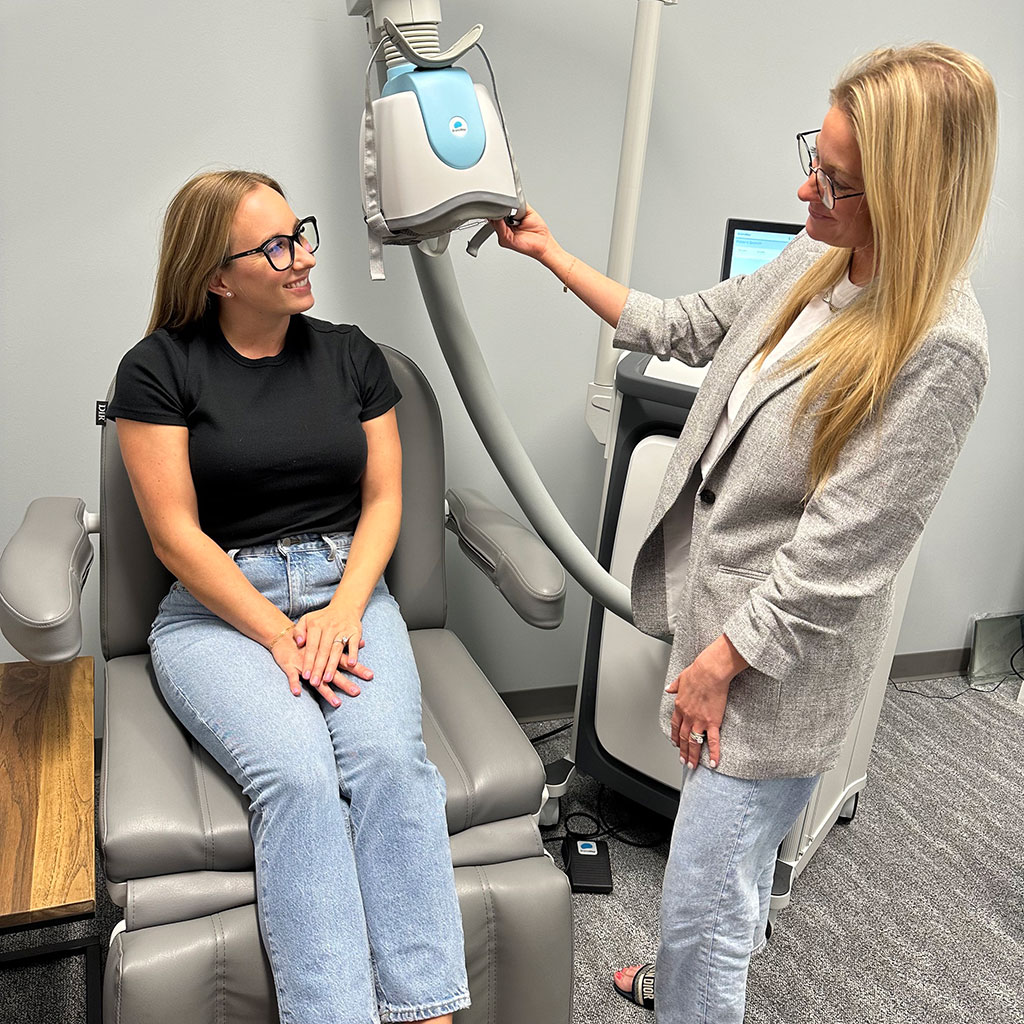Find transcranial magnetic stimulation near you!
TMS Services in Minnesota
Personalized transcranial magnetic stimulation for a happier, healthier you

Wondering if transcranial magnetic stimulation could be right for you?
TMS can be life-changing for the next step in your mental health treatment. Our experienced TMS team is here to support you in making informed decisions about your treatment.

About TMS!
Transcranial Magnetic Stimulation is an evidence-based, non-invasive brain stimulation method that utilizes pulsating magnetic fields to stimulate the frontal lobe of the brain to improve symptoms of depression. Here at Ellie, we use the Deep H1 BrainsWay helmet to target areas of the brain that are impacted by depression. Learn more about TMS here.

Why TMS at Ellie?
- Ellie uses a Brainsway Deep TMS helmet which can reach wider areas of the brain while also directly stimulating those structures located in its deeper regions.
- Ellie’s therapy staff is extensive. Having your treatments all within the same health system is a plus so your team can collaborate!
- TMS often feels scary and Ellie’s mission is to make mental health treatments approachable.

Who can have TMS?
- 18 years of age or older
- Major Depressive Disorder diagnosis
- Trial of 2-4 antidepressant medications without improvement or experienced side effects
- Sufficient trial of evidence-based psychotherapy

Who can’t have TMS yet?
- Bipolar Disorder
- Active Psychosis
- History of seizures or current seizure disorder
- Non-removable metal in the head or neck
- Clients in pregnancy
Our TMS treatment process
Get started
Simply fill out our short referral form or give us a call to get started. Our Ellie Team will contact you within 1-2 days for scheduling.
Initial assessment
Your first appointment will be 60 minutes long. The goal is to get a fuller picture of your mental health. We’ll get to know each other, discuss what you’ve been experiencing, develop a plan, and start your treatment.
Begin treatment
Our team will be with you every step of the way. You will have appointments with your provider throughout your TMS course to check in and optimize treatment. If you need assistance, we are only a call or email away.
You deserve the most out of life.
Let Ellie guide you

“I don’t believe in treatment resistant symptoms, there are just symptoms that haven’t been treated yet”
Dr. Jasberg, Sr. Director of Adult Psychiatry
Frequently Asked Questions
Have questions about how TMS works and how it could impact your life? We’re here to guide you in making this decision! Check out our FAQs below.
What is Transcranial Magnetic Stimulation?
Transcranial Magnetic Stimulation or TMS is an evidence-based, non-invasive brain stimulation that uses pulsating magnetic fields to stimulate the frontal lobe of the brain to improve symptoms of depression.
Ellie Mental Health will be using the Deep H1 BrainsWay helmet, which targets an area of the brain important in depression.
Who can have TMS?
- Patients 18 years of age or older
- Diagnosis of Major Depressive Disorder, recurrent, severe without psychosis (F33.2)
- Typically a trial of four antidepressant medications from two different classes of meds without improvement (this varies between insurance companies)
- Sufficient trial of evidence-based psychotherapy
Who can’t have TMS?
- Patients with non-removable metal in their head or neck
- Patients with a history of seizures or a current seizure disorder
- Bipolar disorder
- Active psychosis
- Patients who are pregnant
Is this covered by insurance?
TMS is covered by most medical insurance carriers for the treatment of depression but clinical criteria must be met. Ellie’s TMS Coordinator can assist in determining if TMS is a covered service and if prior authorization is required before starting.
How would you describe the TMS session? Is it done in a therapy office or a doctor’s office?
TMS produces a loud clicking sound with each pulse, similar to an MRI machine. Clients are seated during each session. A lot of clients compare TMS to a woodpecker tapping a small area of their head repeatedly. Treatment may feel uncomfortable at first but gets better with time.
What does a treatment schedule look like?
A full course of TMS consists of 36 treatments over an 8-week period. Patients will come to the office Monday-Friday and receive treatment every day. A treatment session lasts 30 minutes.
What’s the difference between TMS and ECT?
TMS is an outpatient procedure that uses magnetic fields to stimulate the frontal lobe of the brain. There are minor side effects with TMS and it does not induce seizures.
ECT is a much more intense and invasive treatment that requires anesthesia. This treatment is done in a hospital setting. ECT uses a current to induce seizures and can have side effects such as memory loss.
What diagnoses can be treated by TMS?
TMS has FDA Clearance for Major Depressive Disorder (MDD), Obsessive-Compulsive Disorder (OCD), Smoking Addiction, and Anxious Depression. At this time, Ellie is only treating Major Depressive Disorder.
Does TMS work?
In the multicenter clinical trial that led to FDA clearance, 1 in 3 patients achieved full remission from their depression and 38.4% had their depressive symptoms reduced by 50% after 20 treatments. Existing evidence to date suggests that patients who are less treatment-resistant respond better to TMS than those who are highly treatment-resistant.
What are the side effects of TMS?
The most common side effects clients see are headache and fatigue. These are mild and generally diminished over the course of treatment.
How long does it take to feel results?
Every patient experience results differently. Some patients will feel results more quickly than others. However, this doesn’t mean that treatment is ineffective.
If I go through TMS, will I need to continue seeing a therapist or being on medication?
Yes, it is recommended to continue therapy and take medications after a course of TMS.
Can I work while receiving TMS?
TMS does not require a recovery time after treatments. Patients can drive to and from treatments and return to normal activities after each session.
Why is it better to do TMS at Ellie vs. another clinic?
- Ellie uses a BrainsWay Deep TMS helmet which can reach wider areas of the brain while also directly stimulating those structures located in its deeper regions.
- We want clients to get TMS where they feel comfortable!
- A huge benefit of TMS at Ellie is the therapy staff is so extensive. Having your treatments all within the same health system so your team can collaborate is always a plus.
- TMS often feels scary and Ellie’s mission is to make mental health treatments approachable.









